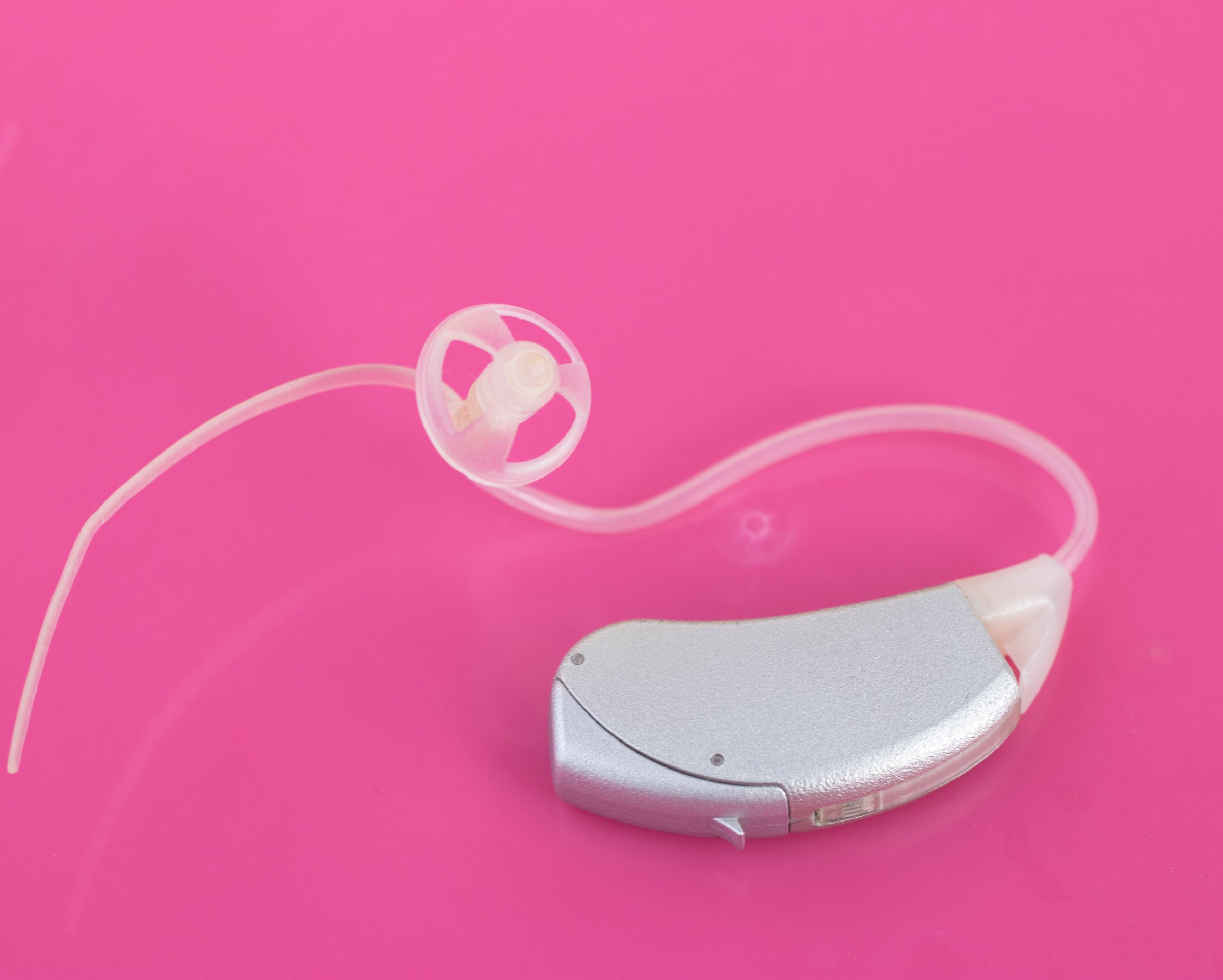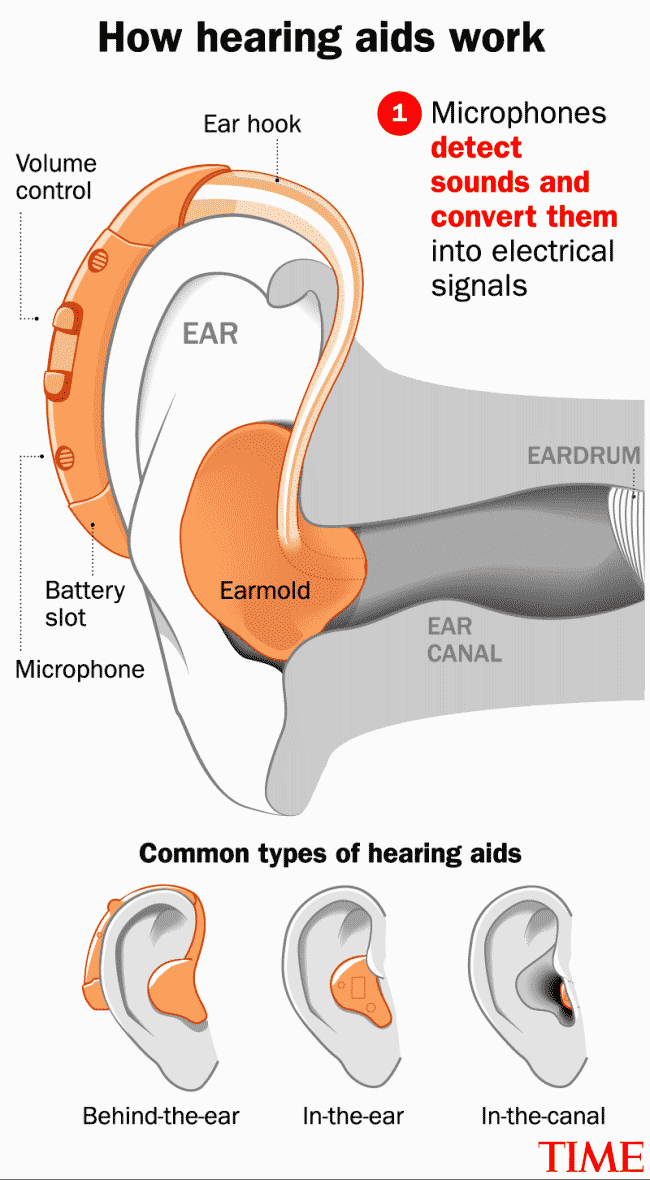
On Oct. 17, hearing aids approved by the U.S. Food and Drug Administration (FDA) became available over the counter for the first time, for potentially thousands of dollars less than prescription hearing aids. Many experts are hopeful that opening the market up will spur the creation of innovative new devices, bring down costs, and encourage hearing-aid use in a country where only a fraction of older adults who are hard of hearing use hearing aids.
What do these expanded options mean for people who are thinking about buying a hearing aid? For now, experts say there’s still a lot we don’t know—including which devices will be announced in the coming months and how much prices may fluctuate on the new market. However, over-the-counter hearing aids could make a big difference in your life if you have mild or moderate hearing loss. Here’s what you need to know.
When will over-the-counter hearing aids be available at stores?
The first over-the-counter hearing aids are available online and in-person at some stores, including pharmacies like Walgreens, beginning this week.
Walmart announced on Oct. 17 that hearing aids will be available at its website, at Walmart Vision Centers in certain states (although the company plans to eventually offer these services nationwide) and at more than 400 Sam’s Club Hearing Aid Center locations.
More stores are expected to announce that they’ll be carrying over-the-counter hearing aids in the coming weeks. Best Buy, for instance, announced on Oct. 17 that it will open hearing centers in 300 stores by the end of the month. Best Buy customers can also use an online hearing assessment tool and buy their products online.
Should I buy an over-the-counter hearing aid?
Over-the-counter hearing aids are intended for people with mild to moderate hearing loss, so the first step is determining whether you are eligible for one.
People with mild or moderate hearing loss tend to have difficulty hearing when talking with people in a group or when there’s background noise, according to the Hearing Loss Association of America. Another sign is needing to turn the volume up on the television or phone. A signal of more severe hearing loss is finding it difficult to hear when you’re having a one-on-one conversation with someone in a quiet environment. For more guidance, the Hearing Loss Association of America has a helpful checklist of potential signs.
An audiologist can help you to determine your level of hearing loss, says Nicholas Reed, an audiologist at Johns Hopkins University. These tests, unlike hearing-aid fittings, are also typically covered by insurance. Other tests are available through apps, including SonicCloud. Reed says hearing tests can be helpful, as people tend to be bad at sensing how much their hearing has changed. “Hearing loss happens really slowly, really insidiously,” he says. “And the truth is, your brain is good at not picking up those kinds of changes.”
People who are more tech-savvy may also be better equipped to buy an over-the-counter hearing aid, since the devices require tinkering to get the fit and levels right, says Dr. Catherine Palmer, director of audiology at the University of Pittsburgh Medical Center.
If you’re not, Reed suggests considering bringing your over-the-counter device to an audiologist to get some help using it. “It’s easy to set yourself on the wrong path,” says Reed. “If you’re at all confused or not super tech savvy, an audiologist could help.”

How much do over-the-counter hearing aids cost? What about prescription hearing aids?
The cost of hearing aids can vary dramatically. Over-the-counter hearing aids can cost anywhere from a few hundred dollars to thousands.
Hearing aids that require a prescription typically cost a few thousand dollars on average for a pair, according to the FDA, although that price is often bundled with other services, including the cost of having the device fitted by an audiologist.
Are over-the-counter hearing aids covered by insurance?
Medicare does not cover hearing aids or hearing aid fittings, although some Medicare Advantage plans offer some coverage. Some private insurance companies cover hearing aids, but not all. Check with your insurance provider to see if you’re covered under your individual plan.
Are more expensive hearing aids always better than cheaper ones?
More expensive hearing aids may come with specialized features, such as being smaller in size and having a smoother user experience, says Reed. However, now that over-the-counter hearing aids have been FDA approved, Reed says that buyers can feel reassured that the products are held to a standard, and less-expensive hearing aids should be able to fit your basic needs if you have moderate or mild hearing loss. If you’re not that comfortable with technology, Reed says, you might even be happier with a simpler (and less pricey) device. “There’s almost no evidence that cost is related to outcomes,” says Reed.
More from TIME
How should I choose an over-the-counter hearing aid?
Hearing is a bit like a “fingerprint,” says Reed. That means hearing loss is a little bit different for everyone—and that hearing aids won’t work the same for everyone.
Over-the-counter hearing aids come in two main types, says Palmer. The first is a self-fitting device, which users typically modify by connecting the device to an application on their smartphone, and then tuning it by listening to sounds. To operate the other type—called a simple modifier—users can manually control volume and sometimes the bass and treble of sounds.
It’s important to buy a device with a warranty so that you can return it if the device doesn’t work for you or your lifestyle, Palmer says. “Until the person uses the device, they will not know if it will meet their needs,” she says. Under the FDA regulation, the packaging must state if your device can be returned. Reed also suggests checking whether the device comes with robust customer support, which can help you learn to use the device and address any problems.
More Must-Reads From TIME
- The 100 Most Influential People of 2024
- Coco Gauff Is Playing for Herself Now
- Scenes From Pro-Palestinian Encampments Across U.S. Universities
- 6 Compliments That Land Every Time
- If You're Dating Right Now , You're Brave: Column
- The AI That Could Heal a Divided Internet
- Fallout Is a Brilliant Model for the Future of Video Game Adaptations
- Want Weekly Recs on What to Watch, Read, and More? Sign Up for Worth Your Time
Contact us at letters@time.com